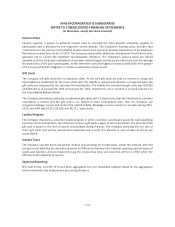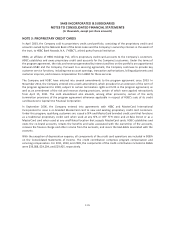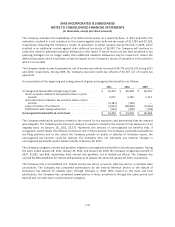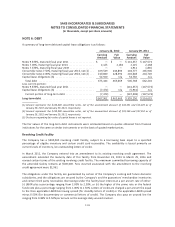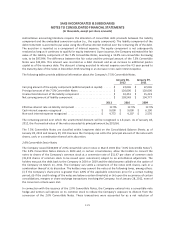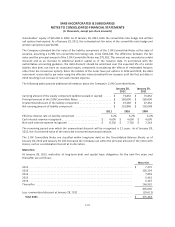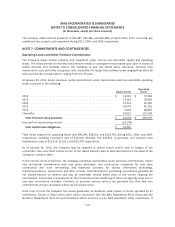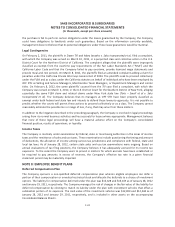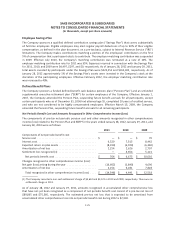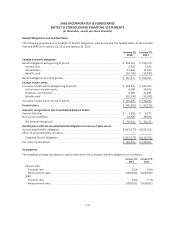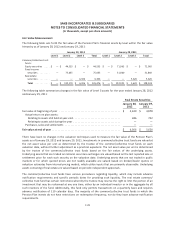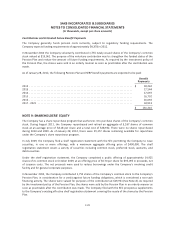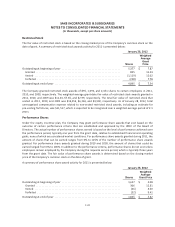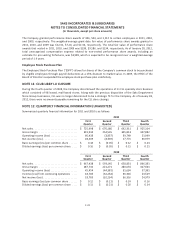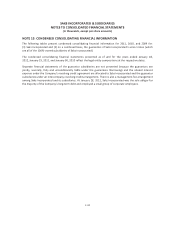Saks Fifth Avenue 2011 Annual Report Download - page 69
Download and view the complete annual report
Please find page 69 of the 2011 Saks Fifth Avenue annual report below. You can navigate through the pages in the report by either clicking on the pages listed below, or by using the keyword search tool below to find specific information within the annual report.SAKS INCORPORATED & SUBSIDIARIES
NOTES TO CONSOLIDATED FINANCIAL STATEMENTS
(In thousands, except per share amounts)
the purchasers fail to perform certain obligations under the leases guaranteed by the Company, the Company
could have obligations to landlords under such guarantees. Based on the information currently available,
management does not believe that its potential obligations under these lease guarantees would be material.
Legal Contingencies
On February 2, 2011, the plaintiffs in Dawn Till and Mary Josephs v. Saks Incorporated et al, filed a complaint,
with which the Company was served on March 10, 2011, in a purported class and collective action in the U.S.
District Court for the Northern District of California. The complaint alleges that the plaintiffs were improperly
classified as exempt from the overtime pay requirements of the Fair Labor Standards Act (“FLSA”) and the
California Labor Code and that the Company failed to pay overtime, provide itemized wage statements and
provide meal and rest periods. On March 8, 2011, the plaintiffs filed an amended complaint adding a claim for
penalties under the California Private Attorneys General Act of 2004. The plaintiffs seek to proceed collectively
under the FLSA and as a class under the California statutes on behalf of individuals who have been employed by
OFF 5TH as Selling and Service Managers, Merchandise Team Managers, or Department Managers and similar
titles. On February 8, 2012, the same plaintiffs’ counsel from the Till case filed a complaint, with which the
Company was served on March 2, 2012, in the U.S. District Court for the Southern District of New York, alleging
essentially the same FLSA claim and related claims under New York state law (Tate – Small et al v. Saks
Incorporated et al). The Company believes that its managers at OFF 5TH have been properly classified as
exempt under both federal and state law and intends to defend these lawsuits vigorously. It is not possible to
predict whether the courts will permit these actions to proceed collectively or as a class. The Company cannot
reasonably estimate the possible loss or range of loss, if any, that may arise from these matters.
In addition to the litigation described in the preceding paragraph, the Company is involved in legal proceedings
arising from its normal business activities and has accruals for losses where appropriate. Management believes
that none of these legal proceedings will have a material adverse effect on the Company’s consolidated
financial position, results of operations, or liquidity.
Income Taxes
The Company is routinely under examination by federal, state or local taxing authorities in the areas of income
taxes and the remittance of sales and use taxes. These examinations include questioning the timing and amount
of deductions, the allocation of income among various tax jurisdictions and compliance with federal, state and
local tax laws. As of January 28, 2012, certain state sales and use tax examinations were ongoing. Based on
annual evaluations of tax filing positions, the Company believes it has adequately accrued for its income tax
exposures. To the extent the Company were to prevail in matters for which accruals have been established or
be required to pay amounts in excess of reserves, the Company’s effective tax rate in a given financial
statement period may be materially impacted.
NOTE 8: EMPLOYEE BENEFIT PLANS
Deferred Compensation Plan
The Company sponsors a non-qualified deferred compensation plan wherein eligible employees can defer a
portion of their compensation or unvested restricted stock and allocate the deferrals to a choice of investment
options. The liability for compensation deferred under this plan was $12,428 and $13,169 as of January 28, 2012
and January 29, 2011, respectively. The Company manages the risk of changes in the fair value of the liability for
deferred compensation by electing to match its liability under the plan with investment vehicles that offset a
substantial portion of its exposure. The cash value of the investment vehicles was $12,000 and $12,568 as of
January 28, 2012 and January 29, 2011, respectively, and is included in other assets on the accompanying
Consolidated Balance Sheets.
F-24


